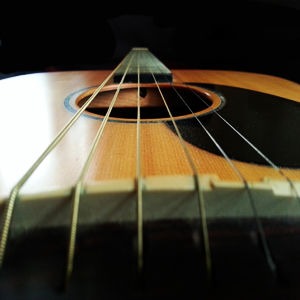 So, you’ve found a Portland guitar teacher you’d like to take lessons from, and scheduled your first lesson, but you don’t have a guitar yet?
So, you’ve found a Portland guitar teacher you’d like to take lessons from, and scheduled your first lesson, but you don’t have a guitar yet?
Don’t want to spend the money on a new guitar? Not to worry.
There are plenty of great deals around, especially in a city like Portland, Oregon. This place is full of musicians, and we often come down with a bad case of gearlust. When we find the latest instrument that we just have to have, sometimes we have to sell something else to make room for it, or quickly scrape together the cash to buy the latest object of our obsessions.
Just scanning Portland Craigslist, you’re bound to see some screaming deals. You may also find great buys in local music stores and pawn shops. But, you’re also going to come across some that aren’t so good. So, how can a beginning guitarist tell the difference?
Things to Check On All Guitars
- Make sure the instrument is structurally sound. Buckle rash and dings and dents are the marks of a well-loved instrument. But, you want to make sure there are no cracks in the neck, especially near the headstock or the area where the neck joins the guitar.
- Look down the neck from behind the bridge of the guitar to make sure it is not warped. If the frets look parallel when holding the guitar flat, it should be OK. If they’re not, proceed with caution.
- The distance between the strings and the fretboard is called the “action”. You want the action low enough that the guitar is easy to play, but not so low that it causes fret buzz.
- Speaking of which, check for fret buzz by fretting each of the strings on every fret. If some of them buzz, you’ll probably need to have some work done on your guitar, or learn to do it yourself. (More on that later)
- Check the frets themselves for excessive wear or gouges. Many vintage instruments will have worn frets, and that does not necessarily mean you should not buy them, if you’ve fallen in love. Just be aware that you’ll probably have to have them leveled or replaced before too long, and factor that into your budget.
- Check for missing or damaged hardware. Parts such as strap buttons, screws and knobs often go missing on older instruments. They can generally be found online, but if they’re missing, you probably want to know before you buy the instrument.
- Make sure the tuners match and work. They should raise and lower the pitch of the strings evenly, without big, sudden jumps in pitch, and should be fairly easy to turn.
Electrics Only
Electric guitars and basses have electronic components, so there are a few extra things to check.
- Electric guitars and basses typically have adjustable bridges. Make sure the adjustable bridge is not missing any screws, saddles or other doodads.
- Plug the guitar in, and turn all of the knobs. Make sure the volume and tone knobs work, and listen for scratchiness. If they sound scratchy when you turn them, it could just be dust, or they could need to be fixed or replaced.
- With all of the guitar’s knobs turned up, make sure the pickup selector switch works. switch between the pickups and listen for big drops in volume or the sound cutting out.
Does It Feel Right?
This may seem a bit silly, but in my experience, when you find the right guitar, you’ll know it. Once it has passed your inspection, pay attention to how it feels in your hands. Do you like the way it sounds? Does it seem like it has been waiting its whole life for you to show up?
Don’t settle for a guitar that you don’t really like the vibe of, just because it’s a good deal. I’m not saying you need to spend a lot of money for a guitar… quite the contrary. I have a $25 bass that I love, and an $800 acoustic that I’m not that crazy about.
Just make sure that the guitar you buy has that ineffable factor known as “it”, whatever that means to you.
Well, that’s all I can think of for now, but I may have missed something.
Do you have any tips for beginners on how to buy a used guitar? Please, share them with us in the comments section.
And, if you’re looking for a guitar teacher in Portland, Oregon, I’m your Huckleberry. Click here to get started.
Thanks!
“He is very knowledgeable and a great player, but not all great guitarists are great teachers. Rick is definitely a great teacher as well, and worth every penny.”
-Lauren A, Portland OR